Rwanda isn’t just a destination, it’s a story of resilience, revival, and raw natural beauty. Nestled in the heart of East Africa, this compact nation punches well above its weight when it comes to safari experiences. Here, wildlife conservation goes hand in hand with luxury travel, offering discerning explorers an intimate, life-changing encounter with nature.
Whether you’re standing mere feet away from a silverback gorilla in the misty forests of Volcanoes National Park or scanning the savannahs of Akagera for lions and elephants, Rwanda delivers a rare blend of exclusivity, sustainability, and thrill. And for those seeking tranquility, the rainforest canopy of Nyungwe Forest National Park whispers tales of ancient trees, curious chimps, and endless green.
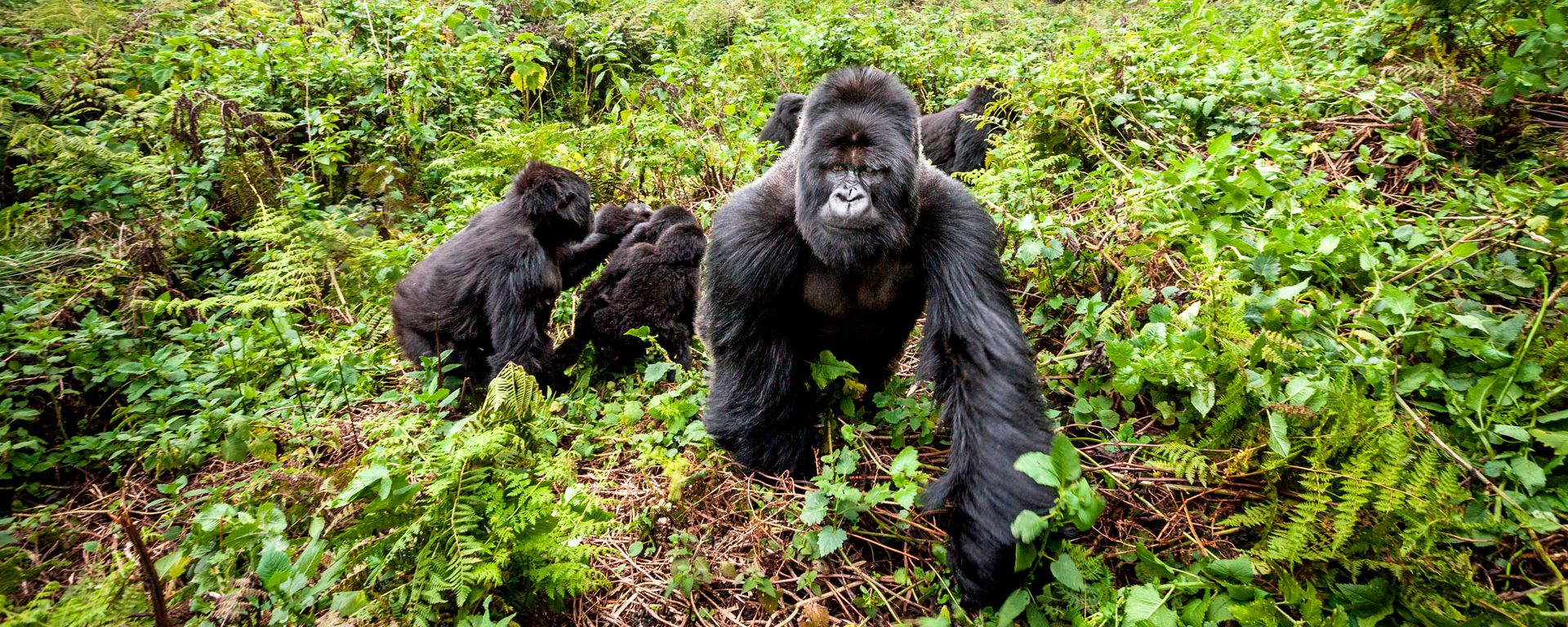
Let’s dive into what makes Rwanda’s gorilla trekking and wildlife safaris so special and why they’re a must for your East African adventure.
There’s something profoundly humbling about locking eyes with a wild mountain gorilla. In the cool morning hours, as mist swirls around the volcanic slopes, you set off on foot with trained guides and trackers. The trek is often challenging, with steep trails, dense forest, and changing weather, but the reward is unforgettable.
Suddenly, your guide signals for silence. You follow his gaze, and there they are: a family of gorillas lounging, grooming, and feeding completely unbothered by your presence. For a full hour, you’re a silent observer in their world. The silverback, broad and powerful, keeps a protective eye on his group. Young juveniles playfully tumble across the undergrowth. It’s a moment that stirs your soul.
Rwanda takes conservation seriously. Gorilla trekking permits cost $1,500 per person, which may sound steep, but these funds are directly reinvested into protecting gorillas and supporting local communities. Rwanda has been a leader in high-value, low-impact tourism, and the success of this model is evident in rising gorilla populations and flourishing local economies.
Only 96 gorilla permits are issued per day, spread across 12 gorilla groups. Booking well in advance, often 6 to 12 months, is essential, especially during peak seasons.
Once ravaged by war and poaching, Akagera National Park has undergone one of Africa’s most remarkable conservation transformations. With the help of African Parks, Akagera has been rewilded and restored, and is now home to the Big Five: lion, elephant, rhino, leopard, and buffalo.
The park spans over 1,100 square kilometers, offering a classic safari experience in a country that’s better known for its rainforests than savannahs. But don’t be fooled, Akagera rivals its East African neighbors with game-rich plains, rolling hills, and vast wetlands.
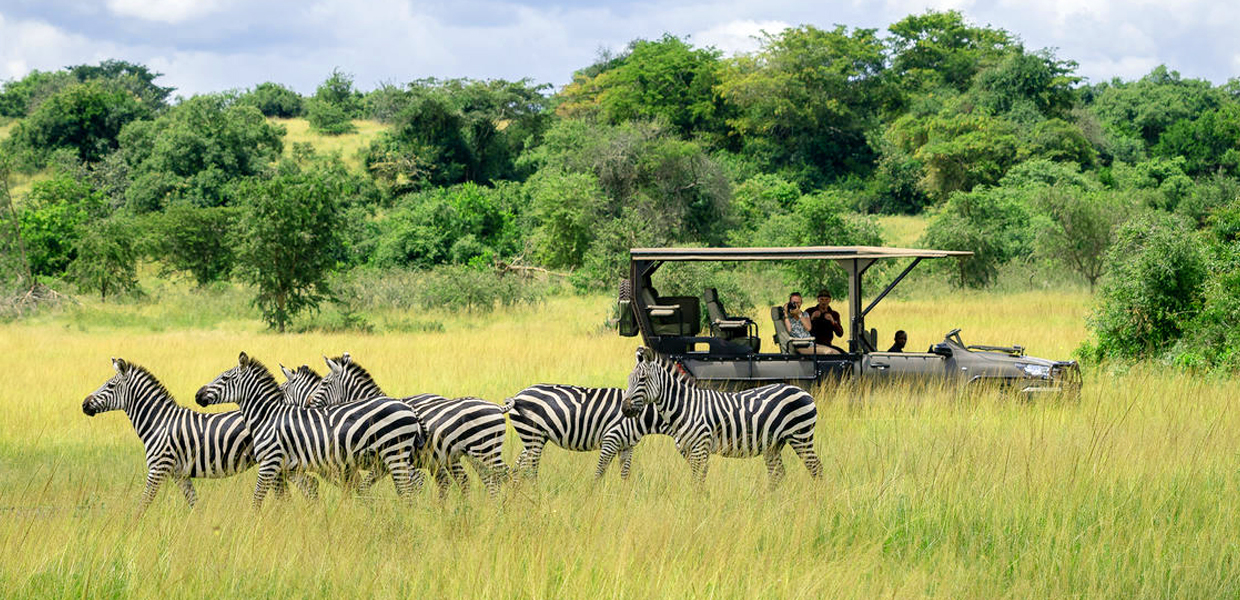
Game drives across Akagera are a delight, particularly in the early mornings and late afternoons when wildlife is most active. You can expect to see zebras, giraffes, elephants, antelopes, and, if you’re lucky, cheetahs or black rhinos, which were recently reintroduced.
But Akagera is more than just game drives. A boat safari on Lake Ihema offers a unique perspective, with hippos, crocodiles, and a variety of water birds all within close view. For an added thrill, night safaris give you a chance to spot nocturnal species like bush babies, hyenas, and leopards.
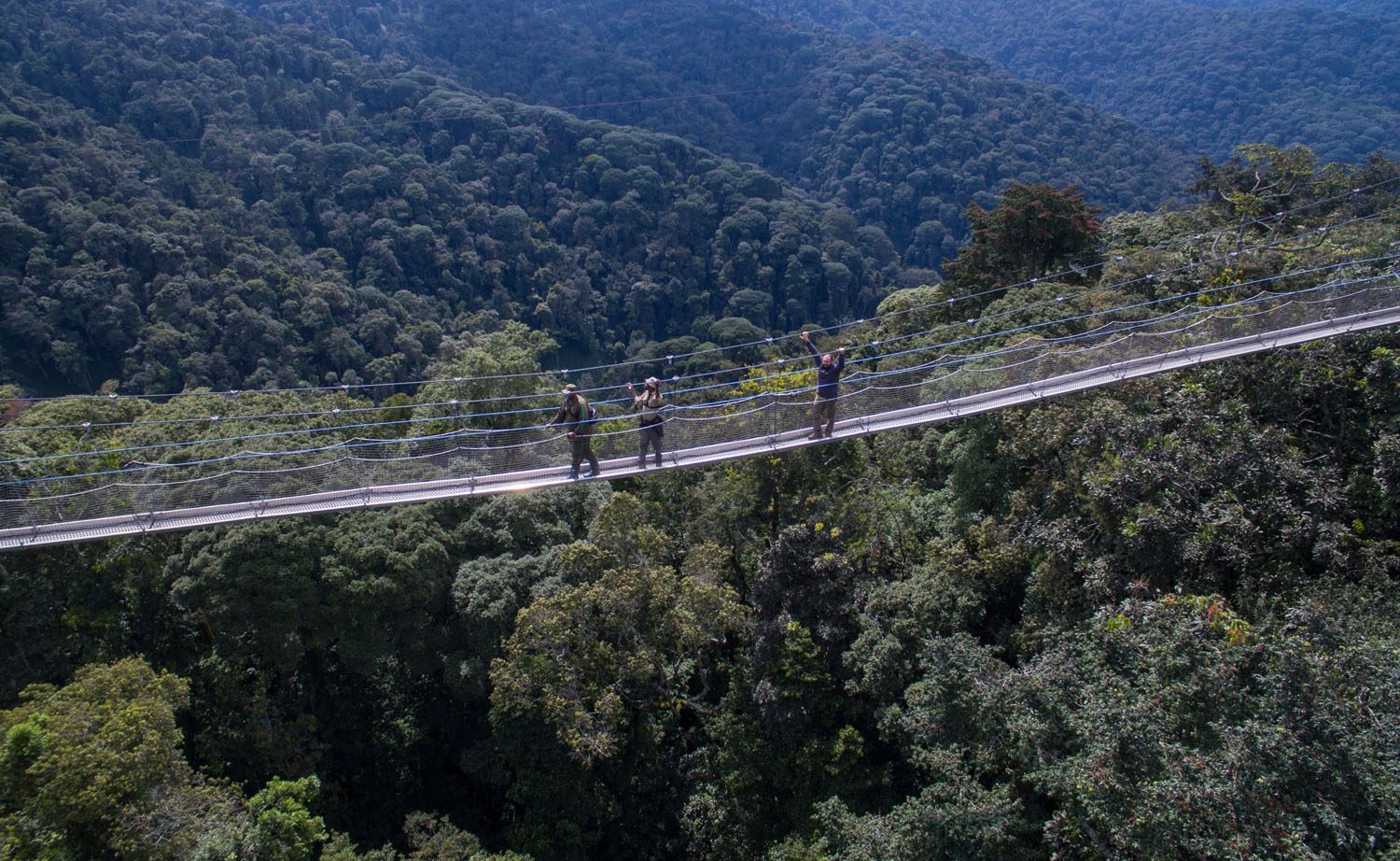
Located in southwest Rwanda, Nyungwe Forest National Park is one of Africa’s oldest and most biologically rich rainforests. Here, everything is alive. The trees hum with the calls of monkeys, birds, and insects. Mist clings to the canopy, and sunlight filters through in golden streams.
Nyungwe is a primate paradise, home to 13 species, including chimpanzees, L’Hoest’s monkeys, grey-cheeked mangabeys, and the largest troop of colobus monkeys in Africa, numbering over 300 individuals.
Chimpanzee trekking is the star activity here. Unlike gorillas, chimps are fast, vocal, and always on the move, making the experience more dynamic and energetic. You’ll follow them through the forest as they swing from branch to branch, feed, and socialize. It’s an adrenaline rush for photographers and wildlife enthusiasts alike.
Don’t miss the canopy walkway, a 200-meter suspension bridge hanging 60 meters above the forest floor. It offers a bird’s-eye view of the lush ecosystem and is an incredible spot for spotting birds and butterflies.
Customise one of our recommended trips or design your own from scratch
or call us on: +255754982525
Rwanda has a mild, tropical highland climate due to its elevation. Safaris and trekking are possible year-round, but conditions vary:
| Season | Highlights |
|---|---|
| June–Sept | Dry season; excellent for gorilla trekking and wildlife safaris |
| Dec–Feb | Short dry period; great weather and fewer tourists |
| Mar–May | Rainy season; trails can be muddy but lush and vibrant |
| Oct–Nov | Short rains; quieter and ideal for budget travelers |
EXCELLENTVerified The perfect combination of comfort, safety and success It was the right decision to make a 5-day trek to Kilimanjaro via the Marangu Route, and the Northern Masailand Safaris served us better than expected. I had a good rest due to the Hut accommodation, which was very important before the summit day.The guides patiently encouraged everyone as they started the summit at night from Kibo Hut. Stepping across Gilman's Point to reach Uhuru Peak was an indescribable feeling. We felt very safe with emergency oxygen, medical kit and experienced guide throughout.Breakfast was good, clean and tasty. It was even better to see their fair treatment of the porters. This trek wasn't just about conquering a mountain - it was about going beyond your limits, and the ««N.M.S»» is the perfect companion to that story.Verified From Arusha Roads to Nairobi Nights It was not just a safari, but an opportunity to see the different forms of nature and life of the two countries together. Each park has its own character, and that change is felt step-by-step on this tour. From the dusty elephants of Tarangire, to the open skies of Serengeti, to the dramatic game drives of Masai Mara - everything was beautifully arranged.The lodges were comfortable, the food was good, and most importantly - the knowledge and behavior of the guides was admirable. From the border crossing to the end of the tour in Nairobi, there was no chaos anywhere. Northern Masailand Safaris has made these 10 days really easy, safe and memorable.Verified More Than a Safari – A Journey Through Nature & Culture Our 5-day Big Cat Safari with Northern Masailand Safaris was truly amazing. James was the guide, his Maasai background and in-depth knowledge of wildlife gave the whole trip a different dimension. In Serengeti, we were able to see several lion families, leopards and cheetahs up close.Descending into the Ngorongoro Crater, it felt like entering a natural amphitheater. Every game drive was planned and never felt rushed. This is undoubtedly the best package for those who want a real experience to see the Big Cat.Verified Four Days Inside Nature’s Greatest Show Sometimes the journey begins on an ordinary road, but ends in the memory of a lifetime - this safari was just that. After coming out of Arusha, as I was moving ahead, the scene around was gradually changing, and I realized that something special was going to happen. After reaching Serengeti, I was shocked to see the movement of wildebeest in the vast plains. So many animals walking together - this scene has to be seen in the eyes, not in the camera.While descending into the Ngorongoro Crater, I felt like I was entering nature. The busyness of the animals around, the silent yet lively atmosphere - the experience was profound and different. Northern Masailand Safaris managed the entire journey in such a way that we just enjoyed it and did not have to think about anything else.Verified Skvělý zážitek kombinující kulturu a safari Naše třídenní safari s ‹‹(Northern Masailand Safaris)›› bylo naprosto dokonalé. Ranní safari u kráteru Ngorongoro bylo vrcholem celého výletu. Černý nosorožec,,lví smečka,,buvol – viděli jsme všechno zblízka.Náš průvodce je skutečný masajský válečník, takže každý příběh, každé vysvětlení bylo založeno na skutečné zkušenosti. Přestože to byla krátká prohlídka, naučil nás o maasajských tradicích, divoké zvěři a úctě k přírodě.Vynikající služby, bezpečná cesta a upřímná pohostinnost – tento třídenní výlet předčil naše očekávání.Verified Two Days, Countless Memories – A Perfect Northern Circuit Safari! We booked the Northern Circuit Safari at Northern Masailand Safaris for only 2 days, and to be honest - the time was short, but the experience was amazing! The joy of going to Lake Manyara and seeing the lions sitting on the trees and the group of big elephants is different. Our guide explained everything very calmly the whole time and knew exactly where any animal could be seen.The moment of landing at Ngorongoro Crater on the second day is truly breathtaking. Such a huge, absolutely perfect natural caldera and the struggle for survival of innumerable animals inside it - everything seems to be in sight. The entire trip was very smooth, timely, and comfortable. Thanks to Northern Masailand Safaris for giving us such a wonderful experience.Verified I have never experienced such an authentic and heart-touching safari anywhere else. My wife and I did an 8-day private safari with Northern Masailand Safaris - Ngorongoro, Serengeti and Lake Natron. Our guide Focus is a real Maasai community man, so it's not book knowledge, it's the forest in his blood. He took us to his village, Maasai women sang and welcomed us, children jumped and danced - this was not a show, this was their real life.And what touched my heart - a large part of the money from the tour goes directly to the Maasai orphan girls' school and shelter. It's comforting to know that I didn't just come to visit, I was able to help a little bit.Accommodation was very comfortable, food was good and the car was very clean. The price may seem a little high, but it's a lot less than what I got. I'll be back with the kids next year.Hakuna matata!🙏 Thank you very much Northern Masailand.Verified A trip experience that is a “must do”! Henry Kapolondo and his guides at Northern Masailand did a fabulous job and I consider this one of the most enjoyable, exciting, informative and important trips of my life. My brother and my son took safaris with Henry’s father and told me this was something I must do. Unfortunately, Henry’s father died before that was possible and I was a little apprehensive about booking with the son. I can share my worries were for nothing. Henry met us at the airport and made sure our experience was fully accommodated. Our guide worked very hard to make sure we had the best trip possible. He was college educated, spoke five languages, and made sure we saw every major animal species in the Serengeti National Park. Hotel and “tent camping” were amazing. All of the Tanzanian people were hospitable and showed they understood how important tourism was to their people and their personal success. The food was and accomodations were above expectation. I would recommend this an experience of a lifetime and every experienced traveler should put this on their list of “must do” destinations. If you read this Henry, I can’t think you enough for making this experience possible. Best wishes to you and your wife and Northern Masailand Adventures. You’re the best!!!Verified Wonderful arrangements, experienced guides and priceless memories. The team of Northern Masailand Safaris is very organized and sincere. The guide was very experienced, explaining to us in detail the history of each animal and region. In Serengeti, we saw lion pride, cheetah hunting, and numerous wildlife, including giraffe, elephant, and buffalo. The moment of landing at Ngorongoro Crater was unforgettable. It has been a privilege to see the black rhino inside the crater - which is a really rare experience.Verified The trip was, in a word, great!! I went on safari in Africa for the first time in my life, and I feel like-why didn't I come here sooner! During the first few days of the game drive, our guide showed us animals that we didn't even know we were looking for. Lions, cheetahs, and rhinos - I have seen them all, and every time the guide has made the place more alive with funny stories. When I arrived in Zanzibar, I felt like I was in a different world - white sand beaches, clear blue water, and sunsets. The service of Northern Masailand Safaris is so smooth and professional that the entire trip was stress-free.
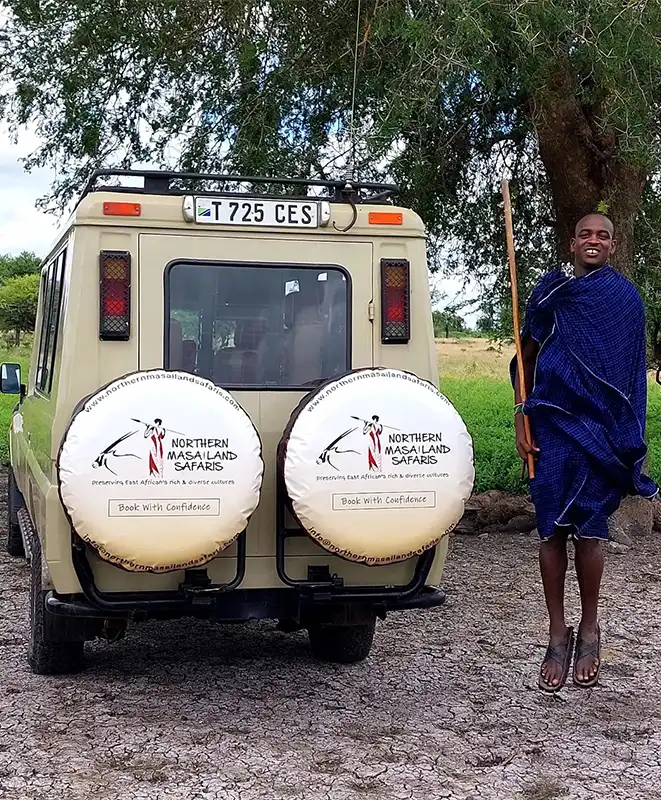
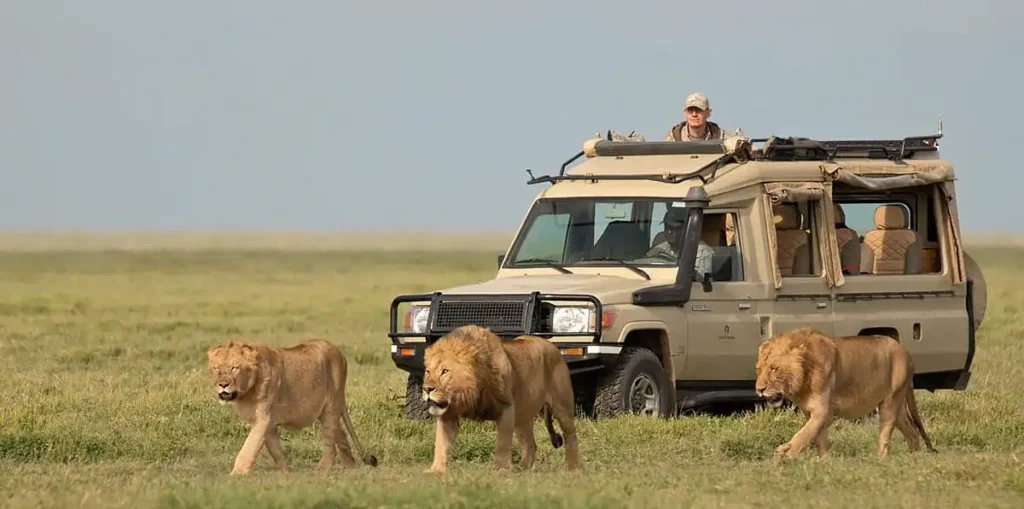
Book Your 2025/2026 Safari Now & Get a Free Masai Culture Tour!
The Maasai are a proud and vibrant tribe known for their distinctive customs and way of life. This free tour offers a unique opportunity to interact with the Maasai people.
Still Have Questions? We’re Here to Help! Contact Us
To secure the best lodges and ensure park availability, we recommend booking at least six months in advance, especially if you’re planning to travel during peak seasons, such as June to October or December to February.
It’s simple. Reach out to us directly through our website, email, or WhatsApp. Let us know your:
Preferred travel dates
Group size
Budget and interests
We’ll send you a customized itinerary within 24–48 hours.
We’ll need your:
Travel dates (fixed or flexible)
Number of travelers (adults and children)
Safari preferences (e.g., luxury, mid-range, or budget)
Activities you’re interested in (e.g., game drives, hot air balloon, cultural visits)
To confirm your safari, we ask for a 30–50% deposit depending on the itinerary. The remaining balance is due 30 to 45 days before your safari begins.
Yes, it’s highly recommended. Your policy should cover medical emergencies, trip cancellation, and baggage loss.
A 30% to 50% deposit is required to confirm your safari booking.
The balance must be paid in full no later than 30 to 45 days before the safari start date.
Bookings made within 30 days of the safari require full payment at the time of confirmation.
We accept the following payment options:
Bank wire transfer (details provided upon request)
Credit/Debit card (processing fees may apply)
Mobile payment options are available in Tanzania
USD ($) is the preferred currency for all transactions
Please note: All bank charges and currency conversion fees are the responsibility of the client.
If you choose to cancel your safari, the following refund terms apply based on the number of days before your safari start date:
| Notice Period Before Travel | Refund on Total Payment |
|---|---|
| More than 60 days | 90% refund |
| 45 – 59 days | 75% refund |
| 30 – 44 days | 50% refund |
| 15 – 29 days | 25% refund |
| Less than 15 days | No refund |
All refunds exclude transaction, bank, and administrative fees.
No refunds will be issued for no-shows, missed departures, or unused services once the safari begins.
In the unlikely event that we must cancel your trip due to unforeseen circumstances (e.g. natural disaster, political instability, or other force majeure events), you will be offered:
A full refund, or
The option to reschedule your safari at no extra cost
Date or itinerary changes are allowed free of charge up to 30 days before departure, subject to availability.
Within 30 days, amendments may incur extra charges based on supplier policies (lodges, airlines, etc.).
All approved refunds are processed within 14 business days.
Refunds are returned using the same method of original payment, unless otherwise agreed.
Passport Validity: Must be valid for at least 6 months from your entry date into Tanzania, with at least two blank pages.
Tourist Visa: Required for most nationalities. You can:
Apply online via the official Tanzania Immigration website: https://visa.immigration.go.tz
Or get a visa on arrival at major airports (Kilimanjaro, Dar es Salaam, Zanzibar)
Cost: Typically $50 USD, $100 USD for U.S. citizens (subject to change)
Tip: We recommend applying online at least 2–3 weeks before travel for faster processing.
Yellow Fever Vaccination:
Required only if you are arriving from or transiting through a yellow fever–risk country (e.g., Kenya, Uganda, Ethiopia).
You must carry your Yellow Fever certificate if applicable.
Recommended Vaccines:
Tetanus, Hepatitis A and B, Typhoid, and COVID-19 (not mandatory but encouraged)
Malaria Prevention:
Tanzania is a malaria-risk zone; consult your doctor for suitable anti-malarial medication.
Use mosquito repellent and wear long sleeves at dawn/dusk.
Travel insurance is mandatory when booking with Northern MasaiLand Safaris. Your policy should cover:
Medical emergencies and evacuation
Trip cancellation or interruption
Lost or delayed baggage
COVID-19-related delays (if applicable)
You must provide proof of insurance before arrival.
Main Airports:
Kilimanjaro International Airport (JRO) – most common for Northern Circuit safaris
Julius Nyerere International Airport (DAR) – for southern Tanzania or Zanzibar connections
Zanzibar Airport (ZNZ) – for beach holidays
Domestic Flights: We can book internal connections (Arusha to Serengeti, Zanzibar, etc.) as part of your itinerary.
Currency: Tanzanian Shilling (TZS), though USD is widely accepted.
Cards: Credit/debit cards accepted at most lodges (some with surcharges), but carry cash for tips, local markets, and small purchases.
ATMs: Available in major towns (Arusha, Moshi, Zanzibar), but not in national parks.